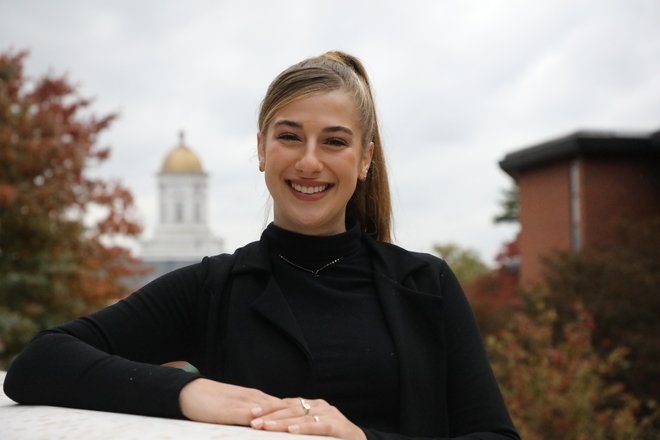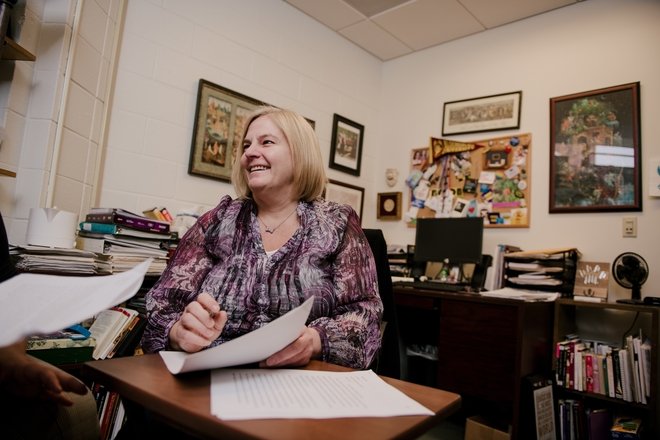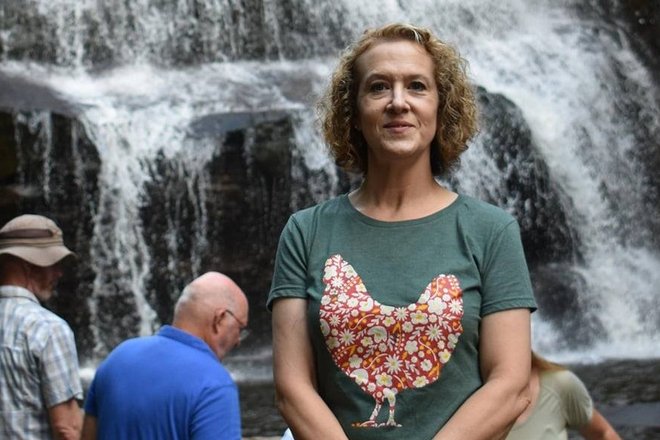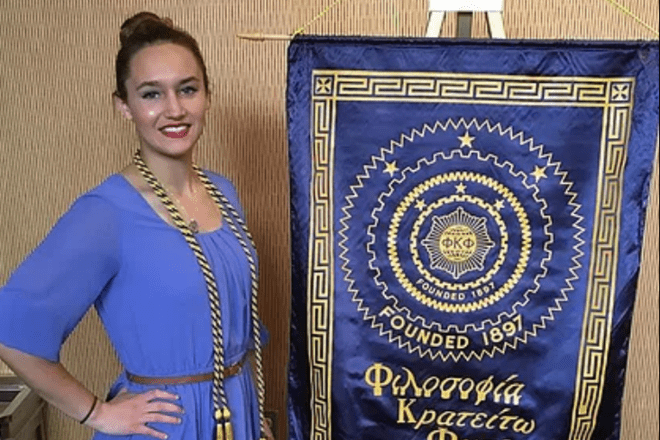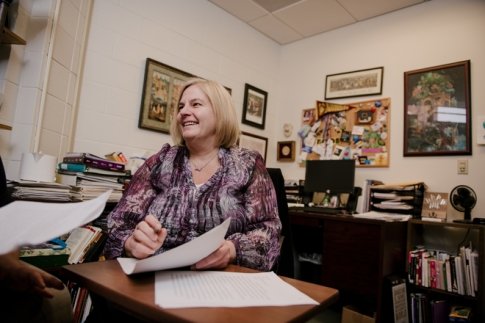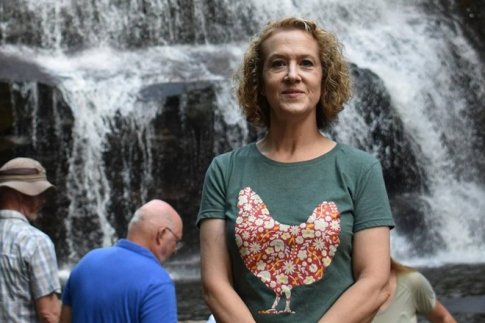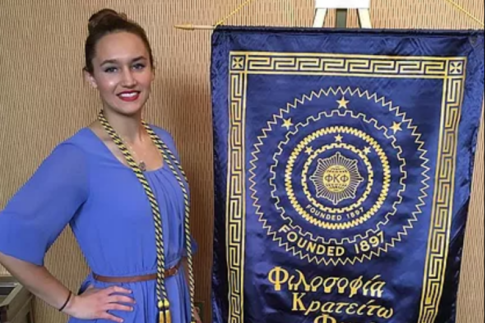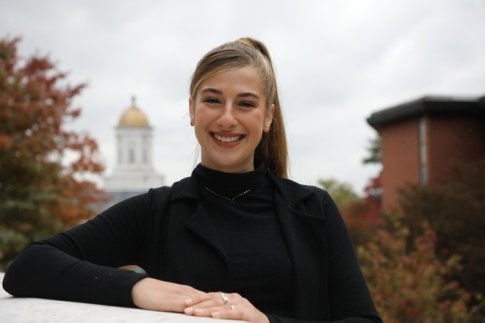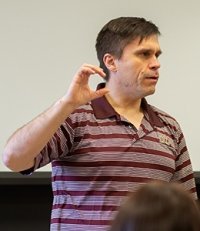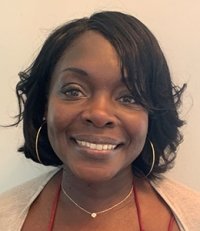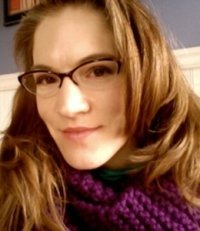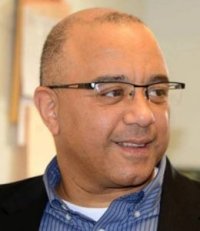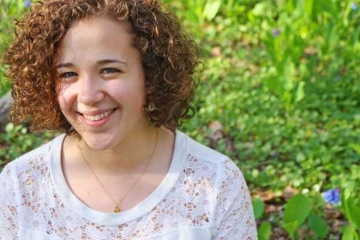
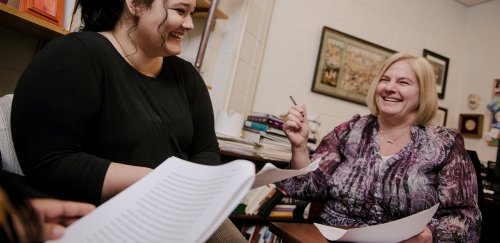
English (B.A.)
English studies is a proven gateway into any number of professional paths. Here at Bloomsburg, you'll gain critical analysis skills; cultural awareness through diverse literatures; an understanding of the power of language and how it functions; the use of language creatively for exposition, persuasion, and artistic effect; and, perhaps most important, the ability to adapt to what comes next.
- Degrees & Offerings
-
- B.A.
- Department
- Program Contact
-
Chair of the Department of English, Professor, Director of Interdisciplinary Studies
Explore your passion for the written word.
We offer four major tracks designed to prepare you for a wide array of careers or graduate study: literature, creative writing, professional writing and digital rhetoric, and secondary education with an English emphasis. We also offer minors in literature, creative writing, technical and professional writing, and linguistics. In addition, we maintain the interdisciplinary minors in gender studies and in ethnic studies in the United States.
English students experience curricular enhancement opportunities such as field trips that connect the texts that they read to the material world, such as performances of Dracula or Othello on the theatrical stage or encountering jousting at a medieval festival. We believe that literature is rooted in real world experiences, past and present. Students most enjoy our upper-division courses dedicated to niche, in-depth study, whether that’s a more traditional course dedicated to Shakespeare or a course that samples literature thematically, such as “Monstrous Mothers.”
Courses and Curriculum
*Please see the CU degree requirements effective Fall 2023. All enrolled students can also review their degree program requirements and track progress to degree completion in Degree Works.
The Literature Track offers in-depth study of literary periods, styles, and genres, as well as linguistics and writing courses. It's perfect for students with interests in digital and print publishing, law school, marketing and public relations, and English graduate study. With its strong emphasis on developing students' strengths as creative critical thinkers and effective writers and on providing a strong foundation in the humanities, this concentration prepares students for careers in the wide range of fields.
Learning Objectives
- Communicate effectively in multiple modes
- Read in multiple contexts
- Recognizing and apply modes of inquiry
- Read analytically
- Recognize of the power of language
Literature faculty teach a range of courses in their specialties, including lower-division survey courses and upper-division close study courses. Literature faculty also create dynamic special topics courses that encourage students to examine literature outside of traditional chronologies and geographies.
Literature track students take courses that represent five main goals:
- develop skills in writing and rhetoric
- experience a range of literature from different periods and regions
- gain knowledge of literary and textual forms, as well as traditions of inquiry
- acquire analytical reading skills
- learn to appreciate the power of language and literature
The Literature track offers significant flexibility for students to pick courses which most interest them. Rather than a prescribed list of required courses, the literature track offers multiple options within categories of study.
Have you ever dreamed of creating a strong character like Katniss Everdeen in The Hunger Games, whose multi-book adventures are complex and exciting? Have you ever wanted to build a world as creative and detailed as the one in your favorite video game? Have you always written poems, but never showed them to anyone?
Then creative writing is the concentration for you.
Students in our creative writing program study contemporary literature and participate in writing workshops in several genres of their choice. This concentration of the English major also gives you necessary skills for numerous jobs with a writing emphasis like social media manager, ad copy writer, and corporate storyteller. Creative writing students work to achieve four primary learning objectives:
- Demonstrate familiarity with a range of literary/critical traditions and cultural viewpoints
- Explain how form, genre, and the history and structure of language relate to the craft of creative writing through critical analysis of varied genres
- Write original and inventive creative works, and
- Compose in a range of artistic and professional genres, including new media, showing how creative writing skills can be deployed in a variety of professional opportunities
Creative Writing Checklists
Practical Learning
- Students in the creative writing track benefit from a scaffolded program which requires them to take a literature genre course before they take the corresponding creative writing course in the same genre. This methodology allows them to fully understand the genre before attempting their own creative projects and underscores the importance of writing as a craft.
- Students in the creative writing track have the opportunity to work with the Warren Literary Journal. As editors, they work on content selection, layout, and design of each issue. This opportunity offers invaluable practical experience in the world of publishing.
- The creative writing program at Bloomsburg University has been hosting the Big Dog Reading Series for over 15 years. This reading series brings published writers to campus for workshops and readings. Students have the opportunity to engage one-on-one with these creative professionals, as well as also experience the power of their work as presented in their own voices. Students are encouraged to engage in Q&A’s to deepen their own understanding of being a creative writer.
- Other professional development experiences include The Voice (BU newspaper), Writing Center (WALES) consulting, and in-house social media content development internships.
Creative writing faculty are all published writers, with active scholarly agendas that repeatedly see acknowledgement through literary prizes and ongoing publication.
Creative Writing Careers

“The creative writing workshops taught me to read critically, hit a deadline, finish a story, give and receive constructive criticism, and revise. Happy to say all that work paid off: I've worked in book publishing for eight years and I signed with a literary agent in 2019!" — Hannah Karena Jones '11, Author and Senior Managing Editor at Running Press Publishers
Creative Writing Opportunities
Take advantage of many opportunities to attend conferences, give readings, edit and publish your own work in the Warren literary magazine.
Writing is something you can do for a lifetime; professional writing is an area of study that integrates language, design, and technology, preparing you for our changing world.
The Professional Writing and Digital Rhetoric Track offers in-depth study of technical and professional writing in print and online. It's perfect for students with interests in writing for business and industry.
With insight and expertise, our English faculty will support and develop your critical thinking and analytical skills as you learn to write and design documentation in our quickly evolving world. As an interdisciplinary track, you will have an opportunity work with other world-recognized faculty in areas like instructional technology and art studio. The experiential learning emphasis of the concentration prepares you for real work situations, developing and honing skills that are in demand in our rapidly shifting online/remote workplace.
The concentration is taught and supported by faculty across the department, through courses in literature, rhetoric, and documentation design, as well as discipline specific writing courses across the university. This track maintains strong connections with programs like digital forensics and a 4+1 master’s instructional design program at BU. All work provides students with a robust foundation that prepares them to work in positions as non-profit managers to national defense contractors.
This track focuses on these specific goals or objectives:
- develop skills in writing, rhetoric, and disciplinary conventions
- demonstrate proficiency in a range of software related to document composition
- acquire an awareness of the power of language through textual analysis; and
- design feasible/usable long-term projects based on the needs of actual clients or commissioning identities.
This track promotes internships that move student beyond the classroom, taking them on a journey from backpack to briefcase.
The Secondary Education English Track is offered in conjunction with the Department of Teaching and Learning to prepare students to teach English in grades 7 through 12.
Important Notice: The Secondary Education/English major is no longer an English department track offering and resides solely with the Education department. Education majors remaining in the pre-integration curriculum, as well as, new/existing students completing the Commonwealth program of study, should defer to their secondary education advisor for assistance with program requirements.
Important Notice: Minor programs are currently under review for approval within the integrated Commonwealth curriculum. At this time, Creative Writing is the only fully approved minor.
The status of the remaining minors will be updated on this website in accordance with the administrative review process. Students who have previously declared a minor should follow the pre-integration sequence for program completion by working with their minor advisor. Students who wish to declare a minor (other than Creative Writing) must await full program approval. Interested students are encouraged to monitor this webpage for updates
Minors complement a student’s major to increase their areas of knowledge and improve their competitiveness on the job market or for graduate study. With planning, students can easily add one or more minors to their major without delaying their graduation date. Students may also major in one of the English department tracks and pursue one of our other minors, such as majoring in creative writing and minoring in technical and professional writing. Typically, minors require 18 credit hours to be counted towards graduation.
- Minor in Literature | Checklist
- Minor in Creative Writing | Checklist
- Minor in Linguistics
- Minor in Professional and Technical Writing | Checklist
- Minor in Gender Studies
Other minors chosen by English majors in the past include foreign language, women's studies, theater, business, communication studies, psychology, anthropology, philosophy, and political science. Choosing a minor may be a beneficial credential when looking for a career after graduation.
We offer a wide array of more than 30 courses that teach students to think critically, read analytically, and communicate effectively. Students interested in literature can choose between American, Non-Western, European, and British texts; while student writers express themselves in the form of fiction, nonfiction, scriptwriting, and poetry. We also offers courses in linguistics that allow students to study the history and structure of language.
Bloomsburg Because
Scholarships
Eligible English majors are encouraged to apply for a number of university scholarships for the coming academic year. In addition, once a year an announcement is made for entries for writing awards.
English Scholarships
- Helen and Ervene Gulley Memorial Scholarship
- Margaret Bittner Parke Scholarship
- Catherine Oplinger and Clark R. Renninger Memorial Scholarship
- Cecil Seronsy Scholarship
- Louis F. Thompson Scholarship
Writing Awards
- Peters Award for Creative Non-Fiction
- Fuller Fiction Award
- Baillie Award for the Critical Essay
- The Savage Poetry Award
Internships
Students with more than 60 hours are strongly recommended to look into an internship. Opportunities include the Bloomsburg Theatre Ensemble, Town Hall, the Chamber of Commerce, and the BU Foundation office. Internships provide you with hands-on responsibility that better prepare you for the work force.
BU’s Writing and Literacy Engagement Studio (WALES) offers internships to students who demonstrate superior writing and proofreading skills. If you enjoy writing and helping other people better their writing, then WALES may be a good place for you. Training is provided, so no previous tutoring experience is necessary. If you're interested, contact Writing Center director Ted Roggenbuck.
Professional U is also offering the following:
- Geisinger Children's Miracle Network Telethon
- Harrisburg (more than a dozen government offices and projects)
- Bloomsburg Theatre Ensemble
- Bloomsburg University Foundation, Inc.
- Bloomsburg Town Hall
- Bloomsburg Chamber of Commerce
Professional Engagement
Students in the Literature track take three required courses that begin introducing them to career prospects, the culmination of which is English 488. In this course, students build portfolios, develop resumes, workshop cover letters, practice interview, and practice job search strategies before graduation.
Many English majors participate in several professional development opportunities, including The Voice (BU student newspaper), Writing Center (WALES) consulting, The Warren (Literary Journal), and in-house social media content development internships.
The Husky Difference

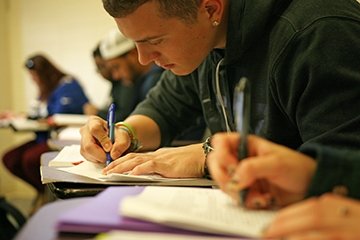
Careers
English majors from all four of our concentrations normally find rewarding and important employment within a year of graduating. Our secondary education majors usually find a position at a public high school but may go on to other careers after a few years. The cluster of skills developed in courses for the English major — critical and accurate reading, analysis, research, and face-to-face and written communication — gives you a head start over other majors in communication for business, government, and non-profit organizations.
Potential Job Opportunities
- social media manager
- technical writer
- public relations specialist
- lawyer
- grant writer
- librarian
- editor and content manager
- human resource specialist
- English teacher
- fundraiser
Top Skills Employers are Looking For
- critical thinking
- teamwork
- written and verbal communication
- critical and accurate reading
- research and analysis
English Contacts
Applying to this Program
Apply
-
Application Process
Review the step-by-step process whether you're a first-year student, transferring to BU, or more.
-
Apply Now
Ready to apply? Great!! Start your online application here.
Explore More
-
Explore Bloomsburg
There's no better way to learn more than to experience Bloomsburg for yourself! Set up a campus tour or connect with us virtually.
-
Connect with Your Admissions Counselor
Applying to college is a big step. You have questions, and we have answers!
-
Financial Aid Guide
Our Financial Aid team is your guide to navigating the aid process here at BU.


